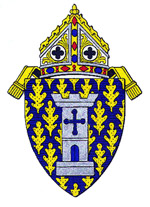The parish is a community of believers where the living stones continue to witness to and to make present the risen Christ, the Chief Cornerstone, to enhance and to bring hope in challenging times, and to renew the joy of following Jesus Christ.
The pastoral care of the parish is entrusted to a pastor as its own shepherd under the authority of the diocesan bishop. The parish is the place where all the faithful can be gathered together for the Sunday celebration of the Eucharist. The parish initiates the Christian people into the ordinary expression of the liturgical life: it gathers them together in this celebration; it teaches Christ's saving doctrine; it practices the charity of the Lord in good works and charity toward all people (CCC 2179).
The Living Stones Planning Committee (LSPC) will consist of a representative group of priests, deacons, religious, and laity selected from the deaneries of the Diocese of Ogdensburg who will support the pastor and the parish community of believers, with the guidance of the Holy Spirit, in living out their baptismal call to "go out and to proclaim the Good News."
The LSPC will follow and allow the Diocese's "Christ-led, Christ-fed, and hope-filled Vision" to guide the deliberations and decisions it will make. There are many challenges and difficulties facing parish life today that warrant new life, new energy, and restored hope for building up the Kingdom of God with Christ Jesus himself as the Master Builder. The people of the parish are the living stones that build up the edifice by their active faith and participation, striving to be a sign of unity, in communion with God, in the midst of the human family.
GOAL:
The LSPC will develop for parishes a plan, along with strategies for implementation, in order to:
a. strengthen parish identity, including but not limited to realignment and restructuring.
b. activate greater participation among the laity in leadership roles.
c. assess the parishes' demographics in relation to the economic and spiritual resources available in each parish and those of neighboring parishes.
The purpose of this plan is to enable parishes to become more vibrant, hope-filled, and joy-filled communities of disciples, to awaken in parishioners a new fervor for their Catholic faith, to restore hope to those away from the Church, and to reach out to those who wish to become members of the Catholic Church. It is hoped that the God-given gifts and talents of the people in the parishes will come forth and bring about a new enthusiasm and zeal for the Kingdom of God.
l. Conduct team-building for the Committee based on the Catholic Leadership Institute[CLI Model].
II. Develop and implement, in consultation with pastors from each deanery, an overall plan for the diocese that meets the pastoral needs of the community of believers in the Diocese of Ogdensburg.
A. Review diocesan and parish data, as well as existing strategies developed by current planning committee.
B. Increase the use of lay leaders throughout the diocese.
a. Review research on the role and use of lay leaders to support pastors with their parish responsibilities.
b. Ensure that there is a plan for assisting, mentoring, and guiding lay leaders.
C. Review research and best practices currently available for pastoral ministry.
D. Develop the financial plan needed to support the plan.
E. Monitor and evaluate the overall plan and revise it as needed. Members of the LSPC should be prepared to visit parishes when necessary and to assist parishes, which may be undergoing change.
III. Design a mechanism for communicating the work of the Living Stones Planning Committee to pastors, deacons, religious and laity throughout the diocese.
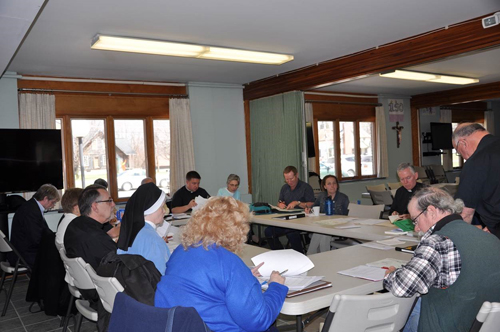
The Living Stones Planning Committee, replacing the previous planning committee, has been meeting since September of 2014. Members of the committee, reflecting broad representation from across the Diocese with a mix of clergy, religious and laity, are: Mr. Gary West (Chairperson), Rev. James W. Seymour (Vice Chair), Rev. Christopher C. Carrara, Rev. Christopher J. Looby, Rev. Joseph A. Morgan, Rev. Kevin J. O'Brien, Rev. Todd E. Thibault, Rev. Martin E. Cline, Rev. Scott R. Seymour, Dcn. Nicholas Haas, Dcn. Peter Woolschlager, Ms. Anita Soltero, Sr. Bethany Fitzgerald, Sr. M Gregory Munger, Ms. Catherine Russell, Mrs. Julie Lanphear, Ms. Starr Burke, Ms. McKenna O'Neil, and Mr. Ben Wake.
9-24-14 Article - Building Parishes with Living Stones
2-11-15 Article – Committee charged with implementing plan
6-17-15 Article - Uniting parishes with Living Stones
7-22-15 Article - Work of the Living Stones Committee
8-31-16 Article - Building Parishes with Living Stones
4-11-18 Article - Living Stones Committee takes on the challenge
4-11-18 Article - Diocesan plan established
5-02-20 Article - Developing a culture of planning
Historical Perspective (PDF)
Key Data (PDF)
Meeting Pastoral Needs part 1 (PDF)
Meeting Pastoral Needs part 2 (PDF)
Meeting Pastoral Needs part 3 (PDF)
Meeting Pastoral Needs part 4 (PDF)
In 2013 prior to the establishment of the vision, priorities and goals for the Diocese, Bishop LaValley conducted listening sessions throughout the Diocese. Following a similar process, in May – June of 2015 the Living Stones Planning Committee organized listening sessions in the eight deaneries of the Diocese in order to get feedback from both the pastors and from people in the pews. The three questions presented for discussion were:
1) What do you recognize and appreciate most as what your parish does best?
2)What do you recommend that would enable us to awaken in Catholics a new fervor for, hope in and understanding of their faith, in order that the parish might more effectively minister to the members of its community?
3) What kind of leadership can we (I) provide to maintain the strengths and address the needs of our (my) parish faith community?
The results of the responses were compiled and are reflected below:
Summary
Total Listening Sessions: 7
Total Responses Received: 742
Sessions Held May 5, 2015 – June 8, 2015.
Question #1: What do you recognize and appreciate most as what your parish does best?
Top 6 Response Categories:
1. Community (Community & Welcoming) - 162
2. Liturgy (Liturgy, Music Homilies) -139
3. Outreach (Outreach and Social Justice) - 103
4. Involvement of the Laity (Laity, Parishioner Involvement) - 102
5. Faith Formation61
6. Youth - 50
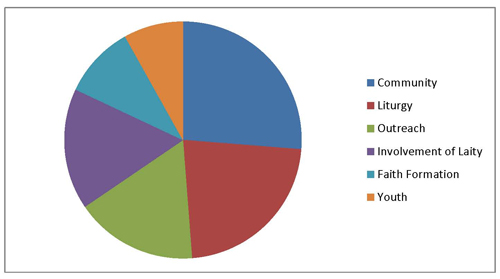
Question #2: What do you recommend that would enable us to awaken in Catholics a new fervor for, hope in and understanding of their faith, in order that the parish might more effectively minister to the members of its community?
Top 8 Response Categories:
1. Faith Formation - 140
2. Involvement of the Laity (Laity, Involvement & Ministries) - 85
3. Youth - 76
4. Outreach (to our own & others: Outreach & Listening) - 50
5. Build Community (Community & Welcoming) - 45
6. Liturgies (Mass, Music, Homilies, Spirituality & Prayer - 45
7. Evangelization - 41
8. Families - 25
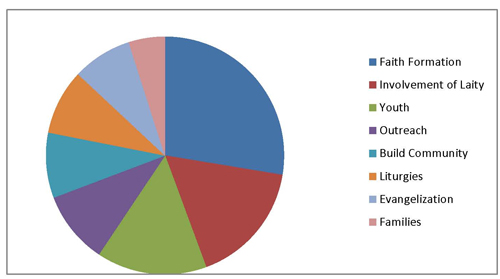
Question #3: What kind of leadership can we (I) provide to maintain the strengths and address the needs of our (my) parish faith community?
Top 6 Response Categories:
1. Involve Laity (laity, ministries, involvement & recognition) - 176
2. Leadership (leadership, priests, deacons) - 63
3. Faith Formation (Faith Formation, Prayers, spirituality) - 52
4. Outreach/Evangelization (outreach, evangelize & listen) - 52
5. Reach out to Youth - 48
6. Support Families - 18
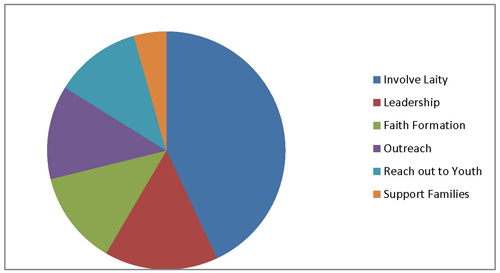
Lessons gleaned for the responses from the Listening Sessions:
A. Involvement of the Laity seems to be seen as a great need need in our parishes (#2 and #3), and there is a base for involvement of the laity in our parishes upon which we can build (#1).
B. Parishes seem to be good at liturgy, building community, and outreach. These are seen as important needs in our communities, yet there seems to be a need to grow in our outreach.
C. Our parishes have a good base in liturgy and building community. These are positives that must be maintained.
D. Faith Formation is appreciated in our parishes but a need for greater Faith Formation is needed.
E. Youth Ministry is appreciated, but improving Youth Ministry is a perceived need in our parishes.
F. Family Involvement is not often mentioned as a strength, but is seen as a need. Ways to involve families and give them support is not an easy fix.
G. Leadership is seen as a great need as we move forward. This leadership is described as involving concern for parishioners, team approaches, creativity and shared responsibilities.
